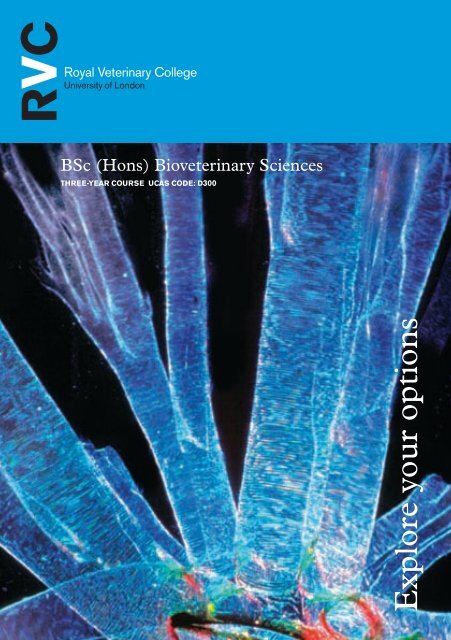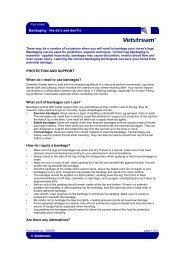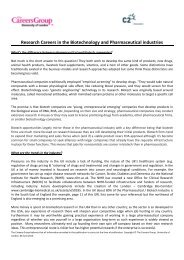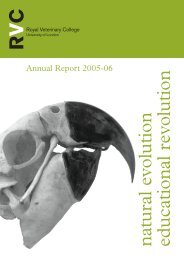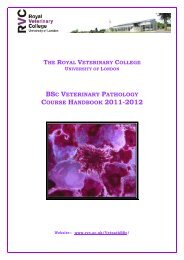BSc BioVet Sciences—Full - The Royal Veterinary College
BSc BioVet Sciences—Full - The Royal Veterinary College
BSc BioVet Sciences—Full - The Royal Veterinary College
Create successful ePaper yourself
Turn your PDF publications into a flip-book with our unique Google optimized e-Paper software.
<strong>BSc</strong> (Hons) Bioveterinary Sciences<br />
THREE-YEAR COURSE UCAS CODE: D300<br />
Explore your options
<strong>The</strong> <strong>Royal</strong> <strong>Veterinary</strong> <strong>College</strong> is a unique institution. It was the first veterinary<br />
school in the UK and has a proud history of innovation and quality in education,<br />
science and clinical service.<br />
Our <strong>BSc</strong> (Hons) Bioveterinary Sciences is a unique blend of the biological<br />
sciences relating to animals, the way they work, their health, their diseases<br />
and their relationships with humans.<br />
We are the largest veterinary school in the UK and therefore you will be taught<br />
by an extensive range of scientists and clinicians who are knowledgeable from<br />
their own experience of animal disease and research.<br />
This means we will cover virtually every aspect of animal biology, management<br />
and disease that is likely to interest you.<br />
We are a constituent college of the University of London which is one of the<br />
great universities in the world, so you will be part of a large academic, social<br />
and sporting community.We can therefore meet all your needs, both for work<br />
and play!<br />
If you want to be a bioveterinary scientist, then the <strong>Royal</strong> <strong>Veterinary</strong> <strong>College</strong><br />
has a course designed with you in mind. I hope that you will join us.<br />
Professor Quintin McKellar<br />
Principal<br />
Cover image: Silk moth caterpillar breathing pore<br />
Inside image: Avian flu virus<br />
1
<strong>The</strong> RVC difference 4<br />
Career prospects 6<br />
Research 8<br />
Programme content 12<br />
Entry requirements 14<br />
Applications 15<br />
Student life 16<br />
Open days and selection 18<br />
‘<strong>The</strong> RVC is a proud, strong college community that<br />
encourages and embraces diversity of thought and<br />
expression. My course encourages original, independent<br />
research too. Instead of being ‘spoon-fed’, we’re free<br />
to pursue any interests we have in specific areas.What’s<br />
more, we are taught by lecturers who lead their respective<br />
fields, have a genuine enthusiasm for their material and<br />
expose us to the latest advances, findings and theories;<br />
and due to the nature of our community, they are never<br />
difficult to track down for a natter.’<br />
Ben Stileman, <strong>BSc</strong> (Hons) Bioveterinary Sciences and SUS President 2007-08<br />
3
4<br />
<strong>The</strong> RVC difference<br />
<strong>The</strong> <strong>BSc</strong> (Hons) Bioveterinary Sciences gives you<br />
a unique opportunity to explore animal and human<br />
sciences in all their diversity, within an active research<br />
culture that enriches your learning experience.<br />
A UNIQUE COURSE<br />
– Integrates the anatomical, developmental, physiological, pathophysiological<br />
and pharmacological aspects of mammalian biology<br />
– Places a strong and early emphasis on the importance of relevant research<br />
– Taught by academics who are actively involved in cutting-edge research<br />
– Focuses on species of economic and biomedical importance<br />
– Provides plenty of practical, hands-on experience<br />
– Delivers a comprehensive education and an appreciation of science<br />
in all its diversity<br />
INSPIRATIONAL SUPERVISION<br />
– Offers you access to many, knowledgeable experts and a rich source<br />
of in-depth biological research<br />
– Gives you the opportunity to undertake biological, medical and<br />
veterinary projects<br />
– Exposes you to internationally recognised scientists specialising<br />
in muskuloskeletal biology, reproduction, genes and development,<br />
cardiovascular biology and inflammation, infection and immunity<br />
and animal welfare
IMPRESSIVE CONNECTIONS<br />
– We are part of the largest bioscience research cluster in Europe<br />
– We are an integral part of London’s extensive scientific community<br />
– We have links with the London School of Hygiene and Tropical Medicine,<br />
the Zoological Society of London, UCL, Animal Health Trust (Newmarket)<br />
and the <strong>Veterinary</strong> Laboratories Agency<br />
– We have strong alliances with world-leading corporations<br />
– We attract visiting UK and international lecturers of the highest calibre<br />
EXCELLENT RESOURCES<br />
– Our spacious research laboratories are state-of-the-art<br />
– Our teaching and learning facilities include one of the best stocked<br />
and managed specialist libraries in the field<br />
– Our clinical, scientific and academic facilities are the best in the UK<br />
– <strong>The</strong> University of London’s scientific research resources are also at<br />
our disposal<br />
PRIME LOCATIONS<br />
– Our London Campus puts you at the capital’s academic and cultural heart<br />
– Our Hertfordshire Campus gives you access to fantastic clinical research<br />
facilities and the RVC Farm<br />
– <strong>The</strong> University of London campus is the capital’s scientific centre<br />
– All three benefit from excellent national and international transport links<br />
FRIENDLY PEOPLE<br />
– Our close-knit community is in the habit of looking after its own<br />
– Your academic and personal tutors will support you at every turn<br />
– An active Students’ Union Society organises lots of lively social<br />
and sporting events<br />
5
6<br />
Career prospects<br />
Today there is a growing need for bioveterinary<br />
scientists who play an important part in the nationwide<br />
promotion of animal and human health and welfare.<br />
<strong>Veterinary</strong> scientists hold prominent positions in the<br />
pharmaceutical and agricultural industries and in the<br />
medical research sector.<br />
A <strong>BSc</strong> (Hons) Bioveterinary Sciences could take you in almost any direction<br />
you choose, scientific or otherwise.<strong>The</strong> only limit is your imagination.<br />
As a qualified bioveterinary scientist, you might work in:<br />
– a natural science laboratory<br />
– a university medical school<br />
– the UK or overseas<br />
– a medical or scientific research institute<br />
– an organisation that deals expressly with animal health and disease<br />
Alternatively, you could work for a pharmaceutical or biotechnology company,<br />
or pursue a career in academic research.<br />
Clinical and non-clinical graduates are employed as research scientists by the<br />
Biotechnology and Biological Sciences Research Council, the Animal Health<br />
Trust, industrial research organisations and the Department of the Environment,<br />
Food and Rural Affairs (DEFRA).
Within DEFRA alone, the choice is wide.You could join:<br />
– the <strong>Veterinary</strong> Field Service<br />
– the <strong>Veterinary</strong> Medicines Directorate<br />
– the Meat Hygiene Service<br />
– the <strong>Veterinary</strong> Laboratories Agency<br />
– or a regional <strong>Veterinary</strong> Investigation Centre<br />
If postgraduate study appeals, you might join a wide variety of taught and research<br />
degree courses, at the RVC or elsewhere. If you develop an interest in teaching<br />
and research work, UK veterinary schools have opportunities for non-clinical<br />
veterinary scientists with postgraduate training in basic biological sciences, such<br />
as microbiology, nutrition, genetics and statistics. And if you were to specialise<br />
in veterinary pathology in Year Three, even more doors might open into the<br />
pharmaceutical, biotechnology or agrochemical industries.<br />
To help you make the most of your degree, we will give you plenty of<br />
opportunity to investigate career choices while you are studying here.<br />
A <strong>BSc</strong> (Hons) Bioveterinary Sciences degree does not make you a member<br />
of the <strong>Royal</strong> <strong>College</strong> of <strong>Veterinary</strong> Surgeons, or allow you to practise as a<br />
veterinary surgeon.<br />
‘I never realised how useful my <strong>BSc</strong> would be. It has<br />
helped me land a fantastic job as a medical rep, and<br />
meets my need for science knowledge on a daily basis.<br />
I also believe my time at the RVC has given me the<br />
confidence to counter assertive objections (also on<br />
a daily basis!), to deliver presentations and meet tight<br />
deadlines. During my professional training, I coped<br />
better than any of my colleagues; which I put down<br />
to the workload I had to learn to manage on the <strong>BSc</strong>.’<br />
Annie Weckie, <strong>BSc</strong> (Hons) Bioveterinary Sciences Graduate<br />
7
8<br />
Research<br />
Develop your investigative skills and benefit from<br />
the findings of others at a college with an unassailable<br />
international reputation for innovative research in<br />
animal and human science and health.<br />
Research will play an integral part in your degree programme.Your studies will<br />
be informed and enriched by the latest advances in knowledge, understanding<br />
and medical and veterinary treatments.You will be guided through every stage<br />
of the research process, from writing and submitting grant applications, to project<br />
management and the dissemination of results.<br />
At the RVC, research crosses departmental boundaries and co-operation<br />
between clinicians and basic scientists is actively encouraged. Broadly speaking,<br />
we focus on the areas that reflect the particular expertise of our staff – bone<br />
biology; locomotion; reproduction genes and development; cardiovascular<br />
and inflammation biology and infection and immunity.<br />
Currently, major research interests include:<br />
– Physiological responses of bone to strain<br />
– Genes involved in muscle growth and development<br />
– Tendon biology – what determines tendon strength<br />
– Biomechanics of locomotion – relating structure and function<br />
– Reproduction and development – effects of nutrition on fertility<br />
– Physiology of sperm and factors influencing its viability in the female tract<br />
– Coronary heart disease – the importance of dietary lipoproteins in atheroma<br />
development and the role of various genes in protecting from ischaemia<br />
– Allergic and inflammatory diseases and their control<br />
– Cardiovascular diseases of veterinary species<br />
– Pathogenesis of viral and bacterial infections, particularly of the<br />
gastrointestinal and respiratory tracts<br />
– Host response to prion infections<br />
– Innate immunity to infectious diseases<br />
– Antibiotic resistance and the pharmacology of antibacterial drugs<br />
– Epidemiology and control of infectious diseases<br />
– Canine diabetes mellitus – the role of autoimmunity<br />
– Animal welfare – the physiological responses of pigs and poultry to their<br />
physical and social environments
With the sequencing of human and other animal genomes, we are now in<br />
the so-called post-genomic era, where understanding gene function in the<br />
physiological context is the primary goal of much biological research. So when you<br />
graduate, should you wish to, you could pursue a career in the biological sciences,<br />
from biomedicine to the transfer of technology into industry and agriculture.<br />
UNDERGRADUATE RESEARCH TEAM<br />
If you would like to get involved in an overseas research project, you can join<br />
our Undergraduate Research Team. Students from all disciplines come together<br />
to structure a research project that will benefit people in developing countries.<br />
Having raised expedition funds, they travel to the country in question, conduct<br />
their research and gain unforgettable, invaluable experience.<br />
Recent projects have been completed in Botswana, the West Indies and Mexico,<br />
where the team worked alongside a veterinary school in the Yucatan.<strong>The</strong>y<br />
undertook a base level study of subsistence livestock in order to investigate<br />
the parasitic and viral causes of production loss in semi-humid, deciduous<br />
jungle villages.<br />
<strong>The</strong> next trip is a bovine tuberculosis survey in Malawi, coupled with the<br />
initiation of an education programme to increase disease awareness in povertystricken<br />
rural areas.<strong>The</strong> programme will focus on animal husbandry, disease<br />
transmission and milk pasteurisation. Animal and human health will benefit,<br />
and increased productivity will have a positive effect on the local economy.<br />
‘This course is unique because it links science to<br />
animals and incorporates human medicine. Originally<br />
I was set on being an equine vet and that’s still my<br />
end goal. But the people here are so passionate about<br />
their research that I’ve been inspired to follow in their<br />
footsteps first. A prestigious degree like this is sure to<br />
be well received, making it a great way into the science<br />
profession, wherever your interests lie.’<br />
Nicola Berryman, <strong>BSc</strong> (Hons) Bioveterinary Sciences Graduate<br />
9
Peranema trichophorum<br />
Blue green algae<br />
Fish louse
Sea urchin embryo four cell stage<br />
E. coli bacterium
12<br />
Programme content<br />
<strong>The</strong> three-year <strong>BSc</strong> (Hons) Bioveterinary Sciences is<br />
aimed at enthusiastic students with a keen interest in<br />
both animals and science who wish to study the basic<br />
biological sciences that inform and support clinical<br />
practice and research.<br />
By focusing on the domesticated animals that form the bulk of veterinary work,<br />
this programme aims to give you a sophisticated understanding of their physiology,<br />
cellular and molecular biology, and the mechanisms of disease.<br />
YEAR ONE<br />
<strong>The</strong> first year deals with the healthy animal, and includes the following modules:<br />
– <strong>The</strong> Foundations of Science is a two-year module that covers experimental<br />
design, scientific method, statistics and epidemiology<br />
– Form and Function is a systems-based introductory course in mammalian<br />
physiology and anatomy<br />
– Control and Regulation moves beyond organs and tissues to reveal the<br />
cellular and molecular mechanisms underpinning normal animal function<br />
– Problem Definition and Investigation introduces you to problem-based<br />
learning approaches and the research laboratory environment<br />
– <strong>The</strong> project in Year One is an extended library-based literature review<br />
of a current research topic in animal or biomedical science<br />
YEAR TWO<br />
<strong>The</strong> second year deals with disease and its treatment, and includes the<br />
following modules:<br />
– <strong>The</strong> Foundations of Science continues to explore experimental design,<br />
scientific method, statistics and epidemiology<br />
– <strong>The</strong> Enemy Without covers microbiology and the role of infection in animal<br />
disease, including the factors determining transmission and virulence<br />
– <strong>The</strong> Enemy Within explores the molecular basis of more challenging<br />
degenerative and proliferative conditions, including neoplasia,<br />
cancer and autoimmune diseases<br />
– Pharmacology: Principles and Practice shows how the biotechnology industry’s<br />
cutting-edge pharmaceuticals can be used to probe normal and diseased<br />
mechanisms, and form a basis for therapy<br />
– <strong>The</strong> project in Year Two is a practical exercise undertaken during a supervised<br />
research laboratory placement
YEAR THREE<br />
In your third year, you will progress to more specialised, in-depth study.You<br />
may choose from a variety of subjects, including Comparative Animal Locomotion,<br />
Advanced Skeletal Pathobiology, Infectious Disease and Reproduction and<br />
Development. Or you might prefer one of a range of courses offered by King’s<br />
<strong>College</strong> London.<br />
One or two students a year get the chance to spend Year Three specialising in<br />
veterinary pathology. Pathology is the science of disease. As such, it is central<br />
to the understanding and conduct of veterinary research, clinical medicine and<br />
surgery.This is a wonderful opportunity for a couple of exceptional bioveterinary<br />
science undergraduates to experience first-hand the excitement of contemporary<br />
pathology, and its far-reaching scientific relevance.<br />
PROJECTS<br />
You will also undertake a substantial research exercise and report. At the end of<br />
Year Two, you will have completed a supervised research laboratory placement,<br />
developing sound laboratory and analytical skills alongside your theoretical<br />
knowledge.This will really help you set about the design and execution of your<br />
third-year project. Independent project work will also be extremely valuable later<br />
on in your career, should you decide to pursue academic or industrial research.<br />
SUMMER VACATION PLACEMENTS<br />
Funding for these supervised research laboratory placements is supplied by<br />
the RVC.<strong>The</strong>y run for between six and ten weeks according to the subject area.<br />
Recent first- and second-year summer vacation projects have investigated:<br />
– the role of MYO and MYF-5 in thymocyte development<br />
– the relationship between compromised blood circulation and striated<br />
muscle development<br />
– the vitrification of bovine spermatozoa<br />
13
14<br />
Entry requirements<br />
Wherever you’re from, if you have the following qualifications or their equivalent,<br />
your application (which will be considered on a case-by-case basis) will be<br />
more than welcome.<br />
ENTRY REQUIREMENTS<br />
A LEVEL<br />
You must have three B grades or above in Chemistry and either<br />
Mathematics, Physics or Biology.Your third A Level can be in<br />
any subject you please (except General Studies).<br />
AS LEVEL<br />
Any AS Levels you have will stand you in good stead, but are<br />
not a requirement.<br />
GCSE<br />
You will need at least five GCSEs at grade C or above including<br />
B grades in English, Maths and Double Science (or in two<br />
separate science subjects).<br />
MATURE STUDENTS<br />
Applications from mature students are also welcome, although there is no quota<br />
of places or special entry scheme if you are over 21. If you have not fairly recently<br />
acquired them, you will probably be asked to obtain high grades at A Level<br />
in the subjects prescribed above. Beyond that, you will be considered<br />
on individual merit.<br />
ANY QUESTIONS<br />
For more information or advice on any aspect of our entry requirements,<br />
please don’t hesitate to contact the Academic Registry.You can telephone<br />
us on +44 (0)20 7468 5149 or email us at enquiries@rvc.ac.uk
Applications<br />
For entry in the following September, please apply through UCAS between<br />
1 September and 15 January.<br />
HOWTOAPPLYONLINE<br />
For all full-time higher education courses at universities and colleges in the UK,<br />
students must apply online at www.ucas.com.<br />
<strong>The</strong>re are three types of applicant:<br />
1 Students at a school or college registered with UCAS<br />
All UK schools and colleges (and a small number of establishments overseas)<br />
are registered with UCAS to manage their students’ applications.<br />
Advice is available from your teacher or careers adviser.You fill in an online<br />
application and submit it to a member of staff. After checking your details and<br />
adding an academic reference, your school or college submits the completed<br />
application online to UCAS.You pay online using a credit card or debit card.<br />
You may also be able to pay through your school or college.<br />
2 Independent applicants in the UK<br />
Other UK applicants, who are not at school or college, apply online independently.<br />
It is likely that you are a mature applicant, who, unlike school and college students,<br />
cannot readily seek advice from your teacher, but can instead consult with various<br />
careers organisations (such as Connexions).You are responsible for paying the<br />
correct application fee, for obtaining and attaching the academic reference and<br />
for submitting the completed application online to UCAS.<br />
3 International applicants outside the UK (EU and worldwide)<br />
Except for those whose school or college is registered with UCAS, individuals<br />
from the EU (excluding the UK), and worldwide, apply online independently.<br />
Advice is available from British Council offices and other centres overseas, such<br />
as your school or college.You are responsible for paying the correct application<br />
fee, for obtaining and attaching the academic reference and for submitting the<br />
completed application online to UCAS.<br />
For all applicants, there are full instructions at www.ucas.com to make it as easy<br />
as possible for you to fill in your online application, plus help text where appropriate.<br />
UCAS also has a comprehensive guide called Applying Online, which can be<br />
downloaded from www.ucas.com<br />
15
16<br />
Student life<br />
We have one campus in Camden, central London<br />
(<strong>The</strong> London Campus) and one on a 575-acre site<br />
in Potter’s Bar, Hertfordshire (<strong>The</strong> Hertfordshire<br />
Campus). Both offer a friendly, supportive<br />
environment and excellent facilities for basic and<br />
applied research and for teaching and learning.<br />
As a bioveterinary sciences student you will be based at our London Campus,<br />
and make occasional visits to the Hertfordshire Campus.<strong>The</strong> London Campus<br />
boasts an extensive library, an anatomy museum, a Learning Resources Centre<br />
and an impressive Great Hall. Common rooms and a newly refurbished refectory<br />
are also on site. And the clubs, bars, restaurants and theatres of Camden and<br />
London’s West End are close by and easy to get to on foot or by public transport.<br />
A 20-minute walk from the London Campus is the ‘university quarter’ of<br />
Bloomsbury, home to the University of London, whose collegiate structure<br />
incorporates the RVC. Here you’ll find some of the nation’s greatest educational<br />
and research facilities, among them the British Library, the British Museum,<br />
Senate House and the Wellcome Trust. A little further afield are Oxford Street,<br />
Leicester Square,Trafalgar Square and many other famous London landmarks.
ACCOMMODATION<br />
Mary Brancker House, located in Kentish Town, offers en-suite self-catering<br />
accommodation with shared kitchens, common rooms and roof terrace.<br />
<strong>College</strong> Grove provides self-catering accommodation on campus. Each unit<br />
has a kitchen/common room and en-suite facilities.<br />
Rooms may also be available in the University of London’s Intercollegiate Halls<br />
of Residence, which provide catered accommodation nearby.<br />
For any further information about RVC accommodation, including costs,<br />
please visit www.rvc.ac.uk/accommodation/<br />
If you’d rather be more independent, the University of London Accommodation<br />
Office can help you find private rented accommodation.You’ll find them at<br />
www.housing.lon.ac.uk<br />
FINANCES<br />
For up-to-date information about finances, including fees, bursaries, grants<br />
and awards, please visit www.rvc.ac.uk/finances/ and www.dfes.gov.uk<br />
‘<strong>The</strong> <strong>BSc</strong> Bioveterinary Sciences is unique in the UK<br />
because it focuses on the whole animal and is taught<br />
in a veterinary environment.What’s more, at the<br />
RVC this course is rounded out by all sorts of other<br />
opportunities; the summer studentships for instance.<br />
I really wanted to live and study in the capital, and<br />
am thoroughly enjoying being part of a close-knit<br />
community and a pretty good rugby team!’<br />
Nick Gover, <strong>BSc</strong> (Hons) Bioveterinary Sciences Graduate<br />
17
18<br />
Open days and selection<br />
OPEN DAYS<br />
<strong>The</strong> best way to get a feel for the RVC is to pay us a visit on one<br />
of our open days, which are held throughout the year. For further details,<br />
please visit www.rvc.ac.uk/courses/undergraduate/openday.cfm<br />
SELECTION<br />
If we decide that you are a suitable candidate, you will be invited to the<br />
London Campus to visit our facilities and meet informally with one or two tutors.<br />
An interview here, while not compulsory, is intended to be a useful, two-way<br />
exchange, rather than an intimidating experience, during which we find out<br />
more about you and you find out more about us.
20<br />
www.rvc.ac.uk<br />
London Campus<br />
<strong>Royal</strong> <strong>College</strong> Street<br />
London NW1 0TU<br />
Telephone +44 (0) 20 7468 5000<br />
Fax +44 (0) 20 7388 2342<br />
Hertfordshire Campus<br />
Hawkshead Lane<br />
North Mymms<br />
Hatfield<br />
Hertfordshire AL9 7TA<br />
Telephone +44 (0) 1707 666333<br />
Fax +44 (0) 1707 652090<br />
Whilst all reasonable care has been taken in the compilation of this publication,<br />
the <strong>College</strong> can accept no liability which might arise from an unintentional<br />
inaccuracy, or from such changes as may take place from time to time. Readers<br />
are recommended to verify current circumstances for themselves whenever there<br />
is a need to do so. Any enquiries relating to this brochure or to the work of the<br />
<strong>Royal</strong> <strong>Veterinary</strong> <strong>College</strong> should be addressed to:<br />
Academic Registry<br />
<strong>The</strong> <strong>Royal</strong> <strong>Veterinary</strong> <strong>College</strong><br />
<strong>Royal</strong> <strong>College</strong> Street<br />
London NW1 0TU<br />
Telephone +44 (0) 20 7468 5149<br />
Email enquiries@rvc.ac.uk<br />
Produced by the <strong>Royal</strong> <strong>Veterinary</strong> <strong>College</strong><br />
Designed by Crescent Lodge, London<br />
Photography by Phillip Meech<br />
Printed by Moore, London<br />
Printed on Revive 75 Silk, a 75% recycled paper<br />
and Revive 100 Uncoated, a 100% recycled paper.<br />
<strong>The</strong> pulp is bleached using an elemental chlorine free (ECF) process.<br />
<strong>The</strong> <strong>College</strong> has charitable status
Established in 1791, RVC is the UK’s longest-standing<br />
veterinary college – with a proud heritage of innovation<br />
in veterinary science, clinical practice and education.


